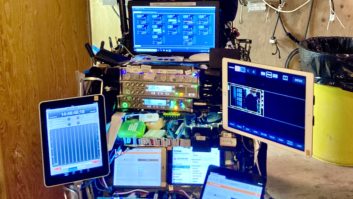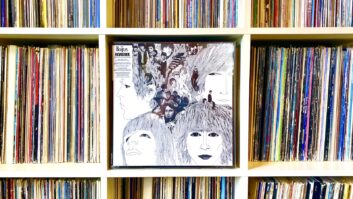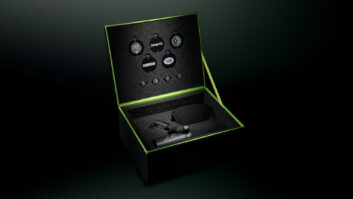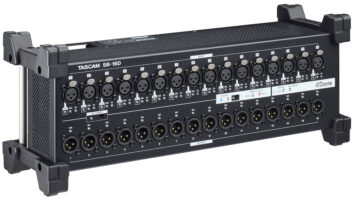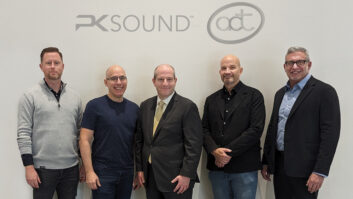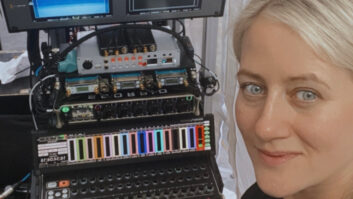Los Angeles, CA (July 1, 2020)—With album titles like Homecoming, Hat Trick, Holiday and Hearts, there’s little doubt that the band America loves the letter H. The band continues that tradition with its latest release, Half Century, an eight-disc box set celebrating America’s 50th anniversary.

Produced and compiled by Jeff Larson for America Archives and released June 20, the box set brings together 50 years of previously unreleased studio recordings, alternate mixes, demos and rehearsals, plus a complete live TV performance from 1973. Two CDs of radio interviews provide a narrative of the band’s decades-long career, and a DVD, exclusive to this release, offers a behind-the-scenes glimpse of the band’s earliest years through their own Super 8 film footage.
During an AXS.tv interview with Dan Rather in late 2019, founding members Dewey Bunnell and Gerry Beckley (the third founder, Dan Peek, left America in 1977 and died in 2011) cheerfully reported that their teenage band’s instant success really didn’t seem that extraordinary to them. Comprising three sons of U.S. Air Force servicemen growing up in England during the late 1960s, America were signed by a major label, Warner Bros., and had a chart-topping hit with their first single, “A Horse with No Name.” Before they knew it, were hanging out in Los Angeles at manager David Geffen’s house with the Laurel Canyon music community.
Larson, a singer-songwriter who grew up in the Bay Area and is now a resident of San Diego, has been involved with America for more than 20 years, ever since he covered one of Beckley’s songs on an album. Beckley later sang on one of Larson’s songs. “The friendship grew over the years to where Gerry produced me in 2007 covering his songs,” says Larson. These days, he says, “We talk daily.”
In 2014, Beckley asked Larson to visit America’s archive locker and transfer some hard drives. While there, he found a bunch of tape and film reels that have since made their way onto Half Century and other releases that, in just the past five years, have included Lost and Found, Archives Vol. 1, Heritage 1970–1973, The Capitol Years and Heritage II 1972–1976, on various labels.
One of those archive reels was the multitrack of “A Horse with No Name.” America’s eponymous debut album was recorded at London’s Trident Studios, but the label wanted a single and asked them to record a few more songs, including “Desert Song,” as it was then titled. “That was done at Morgan Studios in London. They did it there because Gerry was a tape op at Morgan—which is probably why I have the reel,” laughs Larson.
That reel was transferred by Michael Romanowski at Coast Mastering in San Francisco and was released on a three-disc set from Rhino Records, 2019’s The Collection. Larson continues to use Romanowski for transfers and mastering, he says.
Larson’s personal audio setup includes a variety of tools for restoration and editing, including Pro Tools, iZotope noise reduction and various Universal Audio products. He’s currently employing Audionamix Xtrax Stems software on a mixed-down live recording of America at the Hollywood Bowl in 1975 to try and rebalance the band’s vocals. “Kinda like Giles Martin did with the early Beatles, with the screaming girls,” he says.
Creating the 432-Track ‘Woodstock 50’ Box Set
Also among the archive tapes were the band’s 1970 label auditions recorded at Chalk Farm Studios and the studios of Polydor Records and Dick James in London. A couple of the songs only came to light recently, courtesy of a former Warner Bros. executive who had kept the band’s reel. “We got really lucky,” says Larson. “The London demo disc is really a time capsule of the three guys starting out.”
America’s second and third albums were self-produced, but for their fourth, Holiday, they teamed up with George Martin, recording at the producer’s AIR Studios in London in 1974. Martin produced seven of the band’s albums, including Hideaway, recorded at Caribou Ranch Studios in Colorado.
The Caribou Sessions 1976 disc includes a lot of studio banter, says Larson. “I wanted to keep the chatter. It’s like being a fly on the wall.” As for the songs, he says, “Some are bounce mixes, some are demos or rehearsals. For four or five of them, I had to do some light comping and create a mix without getting in the way of George and [engineer] Geoff Emerick, just to get something listenable.”
Beckley was an early home studio adopter, Larson says, building out Buzz Studios in L.A. in the ’70s. Recordings made there, including rehearsals and demos for the early albums, could eventually be released. “They’d work out harmonies,” he says. “I have all of that stuff.”
Bunnell later built a studio, Poison Oak, at his house in Marin, CA. Some of those songs take up an entire disc on the box set. The tracks were recorded after the Martin era and before 1982’s “You Can Do Magic” put America back on the singles chart. “They sound hungry,” says Larson. “They never went back to some of them, so there are unreleased songs. Some were cannibalized for later songs. But it’s another time capsule. You feel like you’re in the ’80s.”
Going through the archive boxes for Half Century, he says, “I came across a lot of video, whether it was a whole pro shoot of a concert in the ’80s or 8mm film they had done of themselves. There’s a lot of the Laurel Canyon scene. It was the heyday of rock ’n’ roll, where they had their own plane with a logo on the side. It’s fun to watch.” The box set DVD is just a sample: “There’s a lot more video that’s been transferred and is on a shelf, waiting,” he reports.
Half Century may be backward- looking, but the band is still very active, touring every year, still working on songs. “Remembering,” the final song on disc 5, The Alternate 90s, is brand new, Larson reports. “It started in ’95, where I had Gerry and some big backing vocals. We later added acoustic guitar, bass and drums. Then I went over to Dewey’s and tracked him at his house in Los Angeles, right before the coronavirus hit. This many years later, you have a new-sounding track.”
And there’s more to come, it seems. Beckley, who married an Australian woman a few years ago, splits his time between California and their house in Sydney. “He’s putting a home studio together over there,” says Larson. “We have older songs with the vocals, but all the MIDI stuff is gone. Gerry likes to build those tracks back up again. So the door’s not shut on material.”
America • www.venturahighway.com
Jeff Larson • www.jefflarson-music.com
